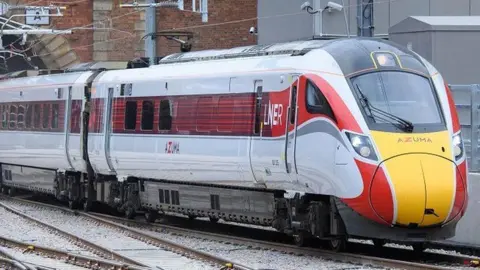 PA Media
PA MediaTrain drivers at London North Eastern Railway (LNER) are set to strike every weekend in September, October and two in November, union bosses have announced.
Aslef, which represents train drivers, said the walkouts at LNER were due to a breakdown in industrial relations and agreements.
The fresh strike action is separate from an ongoing pay dispute with all train companies, which edged closer to being resolved in England this week after a new pay offer.
LNER, which operates services on the East Coast Mainline between London and Edinburgh and is run by the government, said it was “surprised and disappointed” by the announcement following recent talks.
Aslef said its member drivers at LNER would walk out every Saturday between 31 August and 9 November and on every Sunday from 1 September to 10 November.
LNER trains operate from London King’s Cross station and pass through major cities including Newcastle, York and Durham.
Various railway strikes have led to cancelled services and disruption for passengers for more than two years.
The fresh walkouts, which total 22 days, are separate to the long-running row over train driver wages at 16 train companies, which looks set to be resolved in England following a new pay offer made this week.
Mick Whelan, general secretary of Aslef, claimed the union had been “forced” into taking strike action at LNER.
He accused the train operator of “repeatedly” breaking agreements, acting in “bad faith”, and of “boorish behaviour and bullying tactics”.
LNER said it would continue to work with the union to “find a way to end this long running dispute which only damages the rail industry”.
“Our priority focus will be on minimising disruption to customers during the forthcoming Aslef strikes, which sadly will continue to cause disruption and delays,” a statement added.
A spokesperson said the company took “any accusations of bullying very seriously, and this is not something tolerated anywhere in the business”.
The Department for Transport is yet to respond to the announcement.
‘Not enough drivers’
Nigel Roebuck, who has led Aslef’s negotiations with LNER, said members had complained about being consistently “badgered for favours” by managers “outside of rostering agreements and being contacted remotely”.
“The bottom line is that LNER does not employ enough drivers to deliver the services it has promised passengers, and the government, it will run,” he suggested.
Transport Secretary Louise Haigh has previously said she is “committed to resetting industrial relations” following years of strikes.
The Aslef union says it has more than 21,000 members and represents 96% of all the train drivers in England, Scotland, and Wales, where it is organised.
Its leadership team has recommended members accept the newly-tabled offer for train drivers in England, which includes a backdated 5% pay increase for 2019 to 2022, 4.75% for 2022 to 2024, and 4.5% for 2024 to 2025.
The Conservatives have accused Labour of having “just caved to the unions”.
In another separate dispute, however, those working for publicly-run Scotrail are currently being balloted for strike action over pay.
On Friday, it emerged that the RMT union, which had resolved its pay offer with the previous Conservative government, would expect the same terms as those offered to train drivers to be put forward to rail workers, such as guards and signalling staff.
Mick Lynch told the Times that he expected a “parallel, synchronised offer”, adding there could be “problems” if this is not the case.
